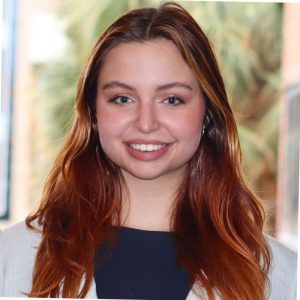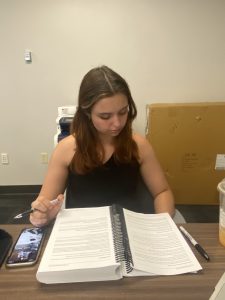Journalism Senior Combines Passion for Storytelling and Technology
By Lenore Devore, B.S. Journalism 1984

Dana Cassidy, B.S. Journalism 2022, winner of $10,000 in the 2022 Reynolds Journalism Institute Student Innovation Competition, knows exactly what she’s going to do with the money: invest it.
In fact, she pretty much knows exactly what she wants to do with her life after college: combine her passion for journalism with her passion for computer programming to become a newsroom engineer, then help to attract others to join the ranks of the extremely tech-savvy journalists.
“I really love working behind the scenes in the newsroom and keeping that line of creativity open,” said Cassidy, 22. “I’d love to be a person in the industry at NICAR (the Investigative Reporters & Editors annual data journalism conference) or other conferences who really encourages students to go down this path. We need to figure out how we get more students to realize they can do this and still use their journalism sense.”
After that, she hopes to build her own team at a newsroom because “there are so many cool things you can do in a newsroom; it’s way more interesting than working in a bank.”
Cassidy won the RJI award for The News Literacy Toolkit to teach fifth graders about news literacy, everything from getting them to try to discern credible news sources to a locator of local newspapers. She came up with the idea after doing a project during an internship at the Miami Herald that really stretched her and improved her computer skills.
Working on the toolkit was trial and error, she said. She started it in September 2021, then worked on it for seven hours a day during and after the Thanksgiving break. “It was a technically challenging process.”
Even if the project didn’t win, she said she already won “because I was leaving with a finished project that teachers and students are using and lives on the web, and I have these skills that took me a while to develop, but now I know how to do something like that again.”
Cassidy also works as a researcher at the Consortium on Trust in Media and Technology and the Brechner Center for Freedom of Information. At the Consortium, many conversations center around trust in news, she said.
“A lot is explained in the news literacy project. It’s not the quality of journalism that’s the problem. It’s the readership, subscribership, business model. That’s the problem. The issue is: How do you get people to read the news and become more news literate and trust technology when there is a lack of trust, and the algorithms are really doing a disservice to people, and certainly social media plays a role.”

She also does research on how reporters can use machine learning and artificial intelligence as a tool to perform some tedious functions, like sifting through 50,000 police documents, she said. “AI can automate hefty processes so reporters can focus on the bigger stories, the features and quality reporting. I’m looking for innovative ways you can use a program you built to convey information or tell a story differently.”
Consortium Managing Director Janet Coats said Cassidy is a “person to watch.”
“Dana’s interest in both media literacy and the ethics of artificial intelligence in journalism have been invaluable in her work for the Consortium on Trust in Media and Technology,” Coats said. “Her powerful curiosity about exploring ways to build trust in journalism is wedded to a ‘let’s get something done’ work ethic, so it’s no surprise that she would succeed in the RJI Innovation Competition. I can’t wait to see what she accomplishes next.”
Cassidy was born in New York and raised in Altamonte Springs, Florida. Her mother is a self-taught computer programmer/software engineer, and her father is a Gator who owned his own soccer academy before the family moved to Colorado three years ago. She has a younger sister and two older siblings, both Gators.
She found her way to a computer and learned how to type playing video games at a young age. One game, Roblox, allowed players to build their own gaming servers. “Because I wanted to make it more advanced, I would go in and try to change things. Inherently, that’s basic programming.”
The competitive dancer also wanted to join the UF Dazzlers, a dance team. She auditioned but didn’t make the cut, and even though she always wanted to go to college, she didn’t know what her future looked like. That’s when her father sent her a tweet to apply to The Independent Florida Alligator, which needed reporters over the summer. “They were willing to hire me even though I knew nothing about journalism. I started reporting there while I was in high school.”
The next summer she covered breaking news and crime as a reporting intern at the Palm Beach Post, followed by another summer internship at the Orlando Sentinel. She’s also covered politics for Fresh Take Florida, the College’s student-staffed statehouse bureau. But during the pandemic, while managing editor of The Alligator, she burned out. “I love journalism, but I couldn’t see myself doing daily reporting. I didn’t want to leave journalism, but I couldn’t find my place. I got back into coding because I had so much free time. I missed working with computers. It stuck.”

She got an internship with the Miami Herald after her junior year, where she worked on coding and investigative skills. When the Surfside condo collapsed, she built a website as a memorial to the victims.
“Building that was super engaging, it felt right. This is a way I can help a newsroom and keep the journalistic mission. It didn’t stretch me too thin as a person or cause me anxiety, which reporting did.”
After that, she started taking data and coding classes offered by the College.
She’s learned a lot about coding and data from Journalism professors Norm Lewis and Mindy McAdams. “The way they teach is phenomenal for learning coding and data.” They sent her to NICAR, fully funded. “That was such a pivotal moment of my senior year. I learned to what level being a technical person in a newsroom is needed. I learned how to apply those technical skills and how to intertwine them better in journalism.”
Journalism Department Chair Ted Spiker is her go-to person when she needs advice, she said. “He was one of the first people I went to when I had this mid-college crisis – not wanting to be a daily news reporter but having all that reporting experience.” She now serves on his student advisory board.
She said students shouldn’t be afraid to talk with professors, especially those who want to be reporters. “You can’t be afraid to talk to people. They are experts in the field and they can help you, even if you want to do the opposite from what they said. If they said this is what I would be doing as a freshman, I would have said they were crazy.”
The beauty of the CJC is students are allowed to try everything, she said. “There is no failing. It’s leading the way in a lot of innovative paths. I hope they continue to expand in the technical path.”
Now about that money. Cassidy said she’s very interested in personal finance and invested it to ”potentially trademark and license the idea and name of my project, The News Literacy Toolkit, then sell it to a company that will keep it free but also have the rights to build and further expand upon it.”
Posted: April 1, 2022
Category: College News, Profiles
Tagged as: Dana Cassidy


